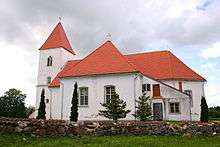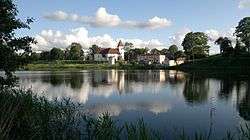Alsunga
Alsunga (also Alšvanga, German: Alschwangen) is a village in Alsunga Municipality, Latvia. Alsunga is the center of the Suiti, a small Catholic community in the Lutheran western part of Latvia.[1] There are approximately 1345 inhabitants in Alsunga.

Alsunga Alšvanga | |
|---|---|
Village | |
 Alsunga village | |
 Alsunga Location in Latvia | |
| Coordinates: 56°59′N 21°34′E | |
| Country | |
| District | Alsunga municipality |
| First mentioned in | 1230 |
| Government | |
| • Mayor | Daiga Kalnina |
| Population | |
| • Total | 1,345 |
| Time zone | UTC+2 (EET) |
| • Summer (DST) | UTC+3 (EEST) |
| Postal code | LV-3306 |
| Calling code | +371 6335 |
| Number of city council members | 13 |
| Website | www.alsunga.lv |
Alsunga was first mentioned in 1230, as an old settlement of Curonians with Curonian name and typical suffix -anga- (comp. Alšvanga, Palanga). In 1372, a castle was built for the vogt of Kuldīga komtur. In 1561 Alsunga became the part of the predominantly Lutheran Duchy of Courland and Semigallia. In 1567 the Saint Michael church was built. In 1623 the local landowner, Johan Ulrich von Schwerin, in order to marry a Catholic court lady Barbara Konarska from Vilnius, agreed to himself become Catholic. After the marriage he lived in Lithuania and Poland until 1632, when he returned to Alsunga after his father's death. In 1634 Johan Ulrich invited Jesuits to establish a mission in Alsunga to help him transfer all his peasants to Catholic faith.
On October 1, 2009, the Suiti cultural space was included in the UNESCO List of Intangible Cultural Heritage in Need of Urgent Safeguarding.[2]
See also
References
- "Who are the Suiti?". "Suitu novads" Foundation. Retrieved 22 December 2018.
- "Suiti cultural space". UNESCO Intangible Cultural Heritage. United Nations Educational, Scientific and Cultural Organization. Retrieved 22 December 2018.
- Krahe, Friedrich-Wilhelm (2000). Burgen des deutschen Mittelalters. Grundriss-Lexikon (in German). Flechsig. p. 692. ISBN 3-88189-360-1.
External links
